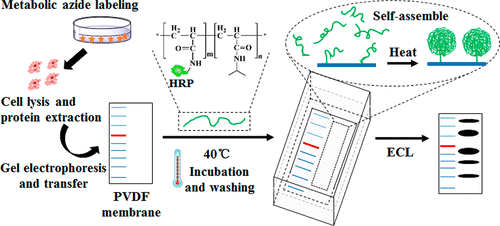当前位置:
X-MOL 学术
›
Anal. Chem.
›
论文详情
Our official English website, www.x-mol.net, welcomes your
feedback! (Note: you will need to create a separate account there.)
Sensitive Western-Blot Analysis of Azide-Tagged Protein Post Translational Modifications Using Thermoresponsive Polymer Self-Assembly
Analytical Chemistry ( IF 6.7 ) Pub Date : 2018-01-16 00:00:00 , DOI: 10.1021/acs.analchem.7b04531 Tong Liu 1, 2 , Wanjun Zhang 2 , Zheng Zhang 2 , Mingli Chen 1 , Jianhua Wang 1 , Xiaohong Qian 2 , Weijie Qin 2
Analytical Chemistry ( IF 6.7 ) Pub Date : 2018-01-16 00:00:00 , DOI: 10.1021/acs.analchem.7b04531 Tong Liu 1, 2 , Wanjun Zhang 2 , Zheng Zhang 2 , Mingli Chen 1 , Jianhua Wang 1 , Xiaohong Qian 2 , Weijie Qin 2
Affiliation

|
Western-blot (WB) is a powerful analytical technique for protein identification in complex biological samples and has been widely used in biological studies for decades. Detection specificity and sensitivity of WB largely relies on quality of the antibodies and performance of the conjugated HRP. However, the application of WB analysis for the detection of protein post-translational modifications (PTMs) is hampered by the low abundance of protein PTMs and by the limited availability of antibodies that specifically differentiate various kinds of PTMs from their protein substrates. Therefore, new recognition mechanisms and signal amplification strategies for WB analysis of protein PTMs is in high demand. In this work, we prepared a soluble polymer that detects various azide-tagged PTM proteins in WB analysis using triarylphosphine and HRP modified thermoresponsive polymer. Specific and efficient detection of azide-tagged PTM protein is achieved via the bioorthogonal reaction between azide and triarylphosphine. More importantly, the chemiluminiscent signal in the WB analysis is largely amplified by the temperature induced self-assembly of numerous thermoresponsive polymer chains carrying multiple HRPs. As a result, approximately 100 times more sensitive detection than commercial antibodies is achieved by this method using standard PTM proteins. Though, this new reagent does not directly detect native PTMs in cell, tissue or blood samples, it still has important application potential in protein PTM studies, considering the wide availability of azide-tagging techniques to a variety of PTMs.
中文翻译:

使用热响应性聚合物自组装对叠氮化物标记的蛋白质翻译后修饰进行敏感的蛋白质印迹分析
Western-blot(WB)是一种用于复杂生物样品中蛋白质鉴定的强大分析技术,数十年来已广泛用于生物学研究中。WB的检测特异性和灵敏度在很大程度上取决于抗体的质量和结合的HRP的性能。但是,WB P用于检测蛋白质翻译后修饰(PTM)的应用由于蛋白质PTM的低丰度以及特异性区分各种PTM与蛋白质底物的抗体的有限供应而受到阻碍。因此,迫切需要用于蛋白质PTM的WB分析的新识别机制和信号放大策略。在这项工作中,我们制备了一种可溶性聚合物,该聚合物使用三芳基膦和HRP改性的热敏聚合物在WB分析中检测各种带有叠氮化物标记的PTM蛋白。通过叠氮化物和三芳基膦之间的生物正交反应,可以实现对叠氮化物标记的PTM蛋白的特异性和高效检测。更重要的是,WB分析中的化学发光信号通过温度诱导的带有多个HRP的许多热响应性聚合物链的自组装而大大放大。结果,使用标准PTM蛋白通过这种方法可实现比市售抗体高约100倍的灵敏检测。尽管这种新试剂不能直接检测细胞,组织或血液样本中的天然PTM,但在蛋白质PTM研究中仍具有重要的应用潜力,
更新日期:2018-01-16
中文翻译:

使用热响应性聚合物自组装对叠氮化物标记的蛋白质翻译后修饰进行敏感的蛋白质印迹分析
Western-blot(WB)是一种用于复杂生物样品中蛋白质鉴定的强大分析技术,数十年来已广泛用于生物学研究中。WB的检测特异性和灵敏度在很大程度上取决于抗体的质量和结合的HRP的性能。但是,WB P用于检测蛋白质翻译后修饰(PTM)的应用由于蛋白质PTM的低丰度以及特异性区分各种PTM与蛋白质底物的抗体的有限供应而受到阻碍。因此,迫切需要用于蛋白质PTM的WB分析的新识别机制和信号放大策略。在这项工作中,我们制备了一种可溶性聚合物,该聚合物使用三芳基膦和HRP改性的热敏聚合物在WB分析中检测各种带有叠氮化物标记的PTM蛋白。通过叠氮化物和三芳基膦之间的生物正交反应,可以实现对叠氮化物标记的PTM蛋白的特异性和高效检测。更重要的是,WB分析中的化学发光信号通过温度诱导的带有多个HRP的许多热响应性聚合物链的自组装而大大放大。结果,使用标准PTM蛋白通过这种方法可实现比市售抗体高约100倍的灵敏检测。尽管这种新试剂不能直接检测细胞,组织或血液样本中的天然PTM,但在蛋白质PTM研究中仍具有重要的应用潜力,











































 京公网安备 11010802027423号
京公网安备 11010802027423号